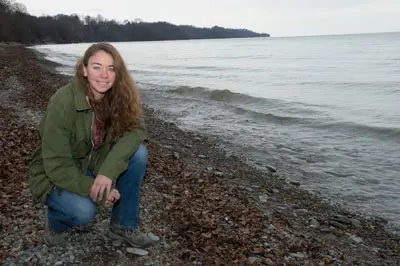



A New York Sea Grant award of just over $135,000 will support a two-year study led by Fredonia Environmental Sciences Professor Sherri Mason, assisted by Fredonia Biology Assistant Professor Courtney Wigdahl-Perry, which will assess environmental impacts of plastics pollution in the Great Lakes.
It’s no surprise that Dr. Mason is at the helm of the study, "Determining Degradation Rates, Products and Impacts for Prominent Plastics in Freshwater Environs.” She pioneered the first-ever Great Lakes plastics pollution survey in 2012. In that landmark report, she concluded that tiny plastic beads commonly found in facial soap, toothpaste and other consumer products are spreading throughout the world’s largest freshwater ecosystem, where they can be consumed by fish and other aquatic life and ultimately move up the food chain.
“Our studies first showed the prevalence of micro-plastics within the Great Lakes. Further studies have shown that some of these micro-plastics enter via wastewater treatment plants and via urban run-off through tributaries to the Great Lakes,” explained Mason, the study’s principal investigator. A separate report supported by a Great Lakes Small Protection Fund grant revealed micro-plastic fibers – about the size of a period in a newspaper article – in 25 species of fish.
Andy Karafa, dean of Fredonia’s College of Liberal Arts and Sciences, said the grant is another example of Mason’s growing impact as an internationally recognized researcher. “She is a great model of what I consider to be a teacher-scholar: someone who is active in her field and provides students with direct exposure to the field,” Dr. Karafa said.
How these micro-plastics make their way into the fish – either directly by eating them or indirectly via zooplankton that ingest them – is the focus of Mason’s new research. Along with Dr. Wigdahl-Perry, co-principal investigator, Mason is also being assisted by Joseph Gardella Jr., co-principal investigator and Chemistry professor at the State University at Buffalo. A sub-award of nearly $90,000 is funding Dr. Gardella’s research.
The New York Sea Grant program received 57 pre-proposals for funding. Only seven projects were ultimately approved for funding.
The Fredonia grant supports one Fredonia graduate and one undergraduate student, and one doctoral student at UB. Overall, more than 20 students at both undergraduate and graduate levels have been actively engaged in Mason-led plastics pollution research studies since 2012.
Being engaged in cutting-edge research can be a life-changing experience for students, Karafa noted. “Not only does it give them the opportunity to apply what they have learned in their classes, but it gives them a chance to demonstrate skills and knowledge sought by employers and graduate/professional schools,” he said.
Work on the study, comprised of four components, began in May 2016 and will continue through April 2018.
Abby Snyder, a doctoral student in Chemistry at UB, and Heather Barnett, a master’s degree candidate in Biology at Fredonia, joined the project in May and June 2016, respectively. They were assisted during the summer months by Jennifer Wasielewski, a senior Biology major at Fredonia.
“Hands-on research like this is what helps bring the information taught in classes to life. This is where it becomes real,” Mason said. “They also learn about organization, data analysis, problem-solving and communication skills.”
In much of academia, it’s unusual for undergraduates to be part of research at this level, Karafa noted. “However, at Fredonia, this is not at all uncommon. Here at Fredonia, we believe in the teacher-scholar model and this is a great example of how this translates into hands-on experiences for our students.”
The first stage of the study determined the degradation rates within three different freshwater environments utilizing laboratory-scale environmental chambers and focusing upon plastics found to be most prominent in Great Lakes open-water surveys. The second stage identified the chemical breakdown products resulting from the mechanical, chemical, biological and photo-degradation of synthetic polymeric materials. Both stages were conducted by Dr. Gardella.
Assessing impacts to the ecosystem, with a focus on filter-feeding organisms through in-lab feeding studies using zooplankton and algae, is the objective of the third stage. The fourth and final stage calls for development of educational/outreach that leads to an understanding of the impacts, as well as possible regulatory and policy needs, for elected officials, environmental and conservation groups and other stakeholders.
Mason, who also chairs Fredonia’s Department of Geology and Environmental Sciences, has already begun sharing findings of her most recent plastics pollution research, giving presentations at the 12th annual Research Symposium in Erie, Pa., and the Great Lakes Environmental Research Laboratory in Ann Arbor, Mich. She has also given a TED talk and addressed the Association of Great Lakes Outdoor Writers in Clymer, N.Y.
“We hope to slowly build up an understanding of the types and abundance of plastics within the Great Lakes and other freshwater systems, laying the groundwork for important additional investigations into their ecosystem impacts,” Mason said.
Better understanding the impacts of micro-plastics in freshwater, especially in the Great Lakes, is essential, Karafa noted. The end result will be actionable research that, along with revealing a better understanding of the impact of micro-plastics on the fresh-water food web, will also lead to much-needed educational outreach efforts.
New York Sea Grant, a cooperative program of the State University of New York and Cornell University, supports research and outreach projects that address shoreline protection, fisheries, aquatic invasive species, water quality, harmful algae blooms and other issues related to the state’s marine and Great Lakes resources.